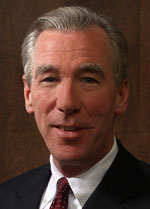“How solitary sits the city,
once filled with people.
She who was great among the nations
is now like a widow.
Once a princess among the provinces,
now a toiling slave.”
These words that open the Book of Lamentations describe Jerusalem after the Babylonian conquest. They have renewed meaning for the Christians of the Middle East today, forced to abandon their cities to escape the sword of a resurgent Islamic militancy.
This month, Sister Diana Momeka of the Dominican Sisters of St. Catherine of Siena came to Washington to testify in Congress about this contemporary persecution. She described the lives Christians live in Iraq and Syria today — an existence unimaginable for most of us.
[hotblock]
Sister Diana’s convent in Iraq had already experienced this kind of hostility once. Civilian authorities in Mosul refused to help them when they were bombed in 2009, so they moved to Qaraqosh, Iraq’s largest Christian city. When the Islamic State’s army arrived on the Nineveh Plain in 2014, the new convent and all of Qaraqosh had to be evacuated as well.
“Starting with the city of Mosul, ISIS overran one city and town after another, giving the Christians of the region three choices: convert to Islam, pay a tribute to ISIS or leave their cities with nothing more than the clothes on their back,” she said. The Christian exodus from the region marks the first time since the seventh century that “no church bells rang for Mass in the Plain of Nineveh.”
Sister Diana added a few words for those who believe Christians should simply run away from their homeland. “Why should we leave our country — what have we done?” she asked.
“The Christians of Iraq are the first people of the land. … Christianity came to Iraq from the very earliest days through the preaching and witness of St. Thomas and others of the apostles and church elders.
“While our ancestors experienced all kinds of persecution, they stayed in their land, building a culture that has served humanity for the ages. … But the current persecution that our community is facing is the most brutal in our history.”
For U.S. policymakers, these words present an issue of foreign policy. For us, they also raise a question about a problem of evil as old as the Book of Lamentations: “They dogged our every step, we could not walk in our squares; Our end drew near, our time was up; yes, our end had come.”
The author of those poems asks God, after all that happened to Jerusalem: “Why have you utterly forgotten us, forsaken us for so long?”
God is never silent, but he rarely works on our timetable. The apostles were fortunate — they only had to wait until the third day to see the temple of Christ’s body rebuilt, as he had promised. And even in that short spell, the Gospel tells us, they began to lose faith. But sometimes suffering goes on and on, and our faith has to remain strong anyway.
It’s hard for us in the West to imagine how difficult it must be to maintain hope in a place where justice is so distant — where persecutions are about exile and bloodshed, not just about courts and rights.
That’s why Sister Diana and the church in Iraq need our help and prayers. Their 40 years in the wilderness may have only just begun.
***
Garvey is the president of The Catholic University of America in Washington.
PREVIOUS: Finance councils: Serving the parish as stewards
NEXT: In gratitude for creation — and bird droppings




Share this story